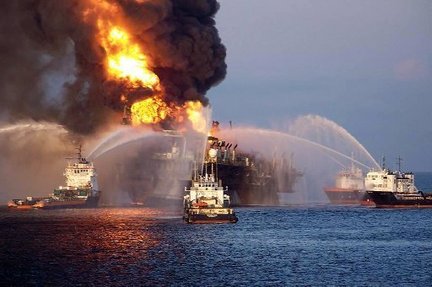Gulf of Mexico drilling disaster triggers counterproductive reaction in California

Santa Barbara environmentalists who have been fighting offshore oil drilling for more than 40 years appeared to have gained a new ally when Governor Arnold Schwarzenegger announced this week that he would withdraw his support for a proposal to mine oil from Tranquillon Ridge because the big spill off the Louisiana Coast couldn’t be ignored.
But, in fact, the leading environmental organization in the area – the Environmental Defense Center (EDC) – is deeply disappointed in the Governor’s decision and surprised that the Gulf Coast events have worked against its proposed plan.
The EDC had negotiated an agreement with Plains Exploration (PXP) to shut down drilling forever in the area after as few as nine years. The carrot for PXP is the right to snake one of its drills further east into segments of Tranquillon Ridge that are under state jurisdiction.
“PXP’s three platforms exist already, and will continue to operate indefinitely without the T-Ridge Plan,” Linda Krop, chief counsel for the EDC told me. “Under our agreement, drilling will end permanently on two of these platforms in nine years and on a third in 14 years. Nobody’s talking about new platforms here. It’s a shut-down plan, not a start-up.”
Krop believes that failure to approve the T-Ridge agreement has less to do with the Louisiana conflagration and resultant spill than it has to do with misunderstandings about the nature of the plan. She explained that PXP already drills into the eastern edges of T-Ridge that sit on federal land, and will be mining the site for many years to come without the agreement. Under the new plan, PXP will be permitted to snake a drill from its existing platform further east into California waters so the oil and gas under T-Ridge can be tapped more rapidly. Then PXP says it will remove all three platforms from the area.
“People here in Santa Barbara understand this agreement and the good it will do. But people in Sacramento don’t get it. They see new platforms, which we would never endorse,” said Krop.
The Gulf Coast disaster provided a stark reminder of the damage that offshore drilling could cause. And such an event could still happen in California. But quashing the T-Ridge plan won’t stop that possibility. Ending drilling will, and that’s what the plan calls for.
“Let us be clear,” said the official statement from the EDC. “There is no other way under the law to shut down existing platforms. It has been 40 years since Platform A spewed 3 million gallons into the ocean and onto our beaches, and yet that platform is still operating today.”
Krop’s reaction to the Governor’s announcement is, to say the least, amazement. “The irony is, we thought the opposite would happen as a result of the Gulf Coast accident, and that people would turn to us with open arms and embrace this plan,” she told me.
The withdrawal means that Californians' desperately overdrawn bank accounts will not receive a transfusion of $100 million or more promised by PXP under the terms of the agreement. "It will not happen here in California," Schwarzenegger said at a news conference. "If I have a choice between the $100 million and what I see in the Gulf of Mexico, I'd rather just figure out how to make up for that $100 million."
Schwarzenegger’s decision is one sign of an unfavorable swing in the public’s desire to drill for oil without regard to the risks. And it puts EDC in the odd position of appearing to stand against a pro-environmental shift.
But Krop says that is far from the reality of the breakthrough shut down proposal that EDC has negotiated. She plans to continue taking the story of T-Ridge beyond Santa Barbara in order to win more converts.
However, the Governor’s withdrawal of support is likely to sound the death knell for the plan, which remains unpopular in Sacramento and unapproved by the State Lands Commission (SLC). And it may seem like the right thing to do in response to the accident on the Gulf Coast.
But it leaves California in a more vulnerable position, and eliminates the possibility of setting end-dates for offshore drilling.




